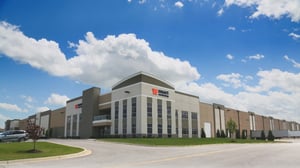With top-notch customer experience being the pillar of any company's success, timely order fulfillment takes center stage. Many e-commerce retailers struggle to find an ideal solution that suits their needs without breaking the bank.
84% of consumers believe that timely delivery is critical to their shopping experience.
The common options a business owner looks into are warehouses, fulfillment centers, and distribution centers. Understanding the difference between them is imperative to making the right choice. Otherwise, you may face unexpected expenses, delays, and a damaged reputation.
In this article, you'll learn key differences between these three options.
What Is a Warehouse?
A warehouse is a large building where your goods or products are stored for an extended period of time. Both small and large e-commerce retailers take advantage of warehouses. You may need a warehouse if:
- You are outgrowing your existing storage space.
- You need to store seasonal products until the season arrives.
- You have to deal with large quantities of products.
- You are arranging logistics on your own.
- You need better product organization.
In short, the main purpose of a warehouse is to keep your goods safe until you need to ship them to the customer.
If you decide to work with a warehouse, you need to arrange warehouse management. This includes:
- Hiring and managing warehouse employees.
- Keeping track of the inventory and equipment in the warehouse.
- Monitoring all processes that take place in a warehouse.
- Forecasting product volume and demand for labor.
- Staying compliant with related warehouse safety regulations.
Benefits of using a warehouse for your e-commerce business include:
- Faster shipping — with proper warehouse management, you can speed up the shipping process.
- Better inventory management — stocking products in a well-managed warehouse can improve inventory management and help you avoid overselling and overstocking.
Downsides of working with a warehouse are:
- Time — you need to be ready to spend time on warehouse management in order not to accomplish the above benefits.
- Cost — maintaining a warehouse requires you to hire extra staff and purchase or lease warehouse equipment.
Overall, warehousing is the first step in the fulfillment process. If you are self-fulfilling orders, you need a place to store your goods.
What Is a Distribution Center?
A distribution center is another step in the fulfillment process. Just like a warehouse, a distribution center is a storage facility that houses goods and products before they are shipped to the end-user.
The manufacturer sends the product to the distribution center where it's distributed to retailers. In short, it's a specialized hub created to store and distribute products.
You may need to work with a distribution center if:
- You are a large company that needs help with product distribution to smaller retailers.
- You need assistance with order fulfillment on a large scale.
- You need to ship products in bulk to other locations.
- You need to move your inventory closer to shipping points.
- You are a retailer who wants to buy small quantities of products.
Distribution centers usually ship products from business to business or to fulfillment centers. Compared to fulfillment centers, distribution centers may have longer shipping times since they are located away from major markets.
Benefits of using a distribution center include:
- Time and cost-saving — the ability to move products to their destination quickly cuts costs and saves time.
- More options for retailers — retailers can buy products in smaller quantities.
- Higher customer satisfaction — faster shipping and simplified distribution make products more accessible to the customer.
Downsides of using a distribution center are:
- Possible inventory errors — an additional step in a supply chain could lead to inventory errors unless appropriate technology is used.
- Expenses — not all companies can handle the expenses associated with such a collaboration.
Unlike a warehouse, which is a static storage facility, the distribution center often handles complex operations like picking and packing, cross-docking, returns, and even product assembly.
What Is a Fulfillment Center?
A fulfillment center is a place where products are distributed and shipped to the consumers. A retailer or manufacturer sends products to the center, where they are packed and shipped to the final destination.
A fulfillment center allows e-commerce companies to outsource both warehousing and shipping. It can be an excellent solution for retailers who don't have a place to house their inventory or time to manage it.
You may need to work with the fulfillment center if:
- You are a small business that doesn't have a place to store products.
- You need assistance with inventory management.
- You want to speed up the shipping process.
- You want a reliable partner to deliver your products to the customer.
The key benefits of working with a fulfillment center include:
- Inventory management — you don't need to worry about overselling or overstocking products.
- No middleman — you can arrange for the manufacturer to send products directly to the fulfillment center, where they are packed and shipped to the customer. This decreases the overall delivery time.
- Better rates — fulfillment centers work with major shipping companies and often negotiate lower shipping rates, which in turn help smaller retailers offer free shipping.
Working with a fulfillment center comes with a few downsides:
- Lack of control — you give up control over how and when your products are shipped and handled. For example, back in March 2020, Amazon suspended shipments of non-essential products to its warehouses, leaving companies to struggle with unfulfilled orders.
- Potential cost increase — fulfillment centers may increase costs unexpectedly, causing companies to face budget issues.
With pros and cons in mind, a fulfillment center is the only one of the three options that handles delivering the product to the customer.
Find a Partner That Does it All
Warehouses, distribution centers, and fulfillment centers are an integral part of a comprehensive and successful order fulfillment process. With modern consumption trends, you need a partner that:
- Exceeds storage options.
- Meets B2B demands.
- Works with B2C e-commerce needs.
- Delivers orders quickly and accurately.
At Smart Warehousing, we combined all of the above to create a brand-new approach to effective fulfillment for B2B and B2C clients. Our warehouse fulfillment center is specifically designed to capitalize on all the benefits of the above options while eliminating the downsides.
Take Full Advantage of a Comprehensive Fulfillment Solution
With customer demand growing higher every year, e-commerce retailers struggle to meet their expectations. Almost 70% of consumers are much less likely to work with a retailer in the future if the product isn't delivered on time.
If you are looking for a comprehensive fulfillment solution to meet your needs without breaking the bank, we are here to help. To learn more about working with our warehouse fulfillment center, contact us at any convenient time.


